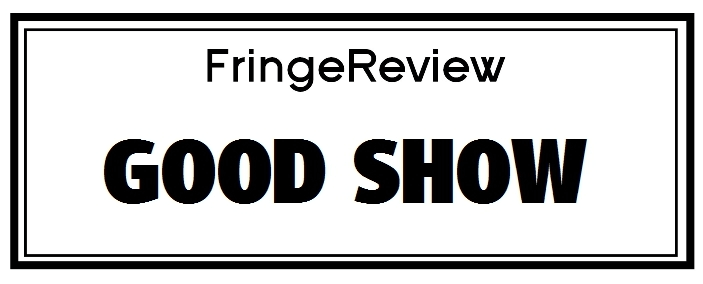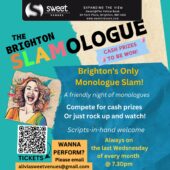Brighton Year-Round 2025
Mummified
Seen&Heard, Boarding School Concern, Switalskis

Genre: Autobiography, Contemporary, Drama, Fringe Theatre, LGBT Theatre, New Writing, Political, Surrealism, Theatre
Venue: Waterbear Music Bar
Festival: Brighton Year-Round
Low Down
Marcus Pollett returns with a much-expanded version of his autobiographically-inspired play Mummified. Directed by him too, now with a cast of seven and full creative team, it plays at the Waterbear Music Bar till November 15.
We need this witness and the creative act of its impact statement. Unmissable
Review
“Only the public school system can make a man for life and ruin him for eternity.” So wrote Raymond Asquith to John Buchan in 1901, after his own experience at Winchester. That was the benign version, a favoured son with glittering prizes. What of ten years of having your life eviscerated and embalmed into a product of boarding schools? That’s a lot more common, and in the 21st century still hasn’t ceased. After a sold-out Fringe run in May, Marcus Pollett returns with a much-expanded version of his autobiographically-inspired play Mummified. Directed by him too, now with a cast of seven and full creative team, it plays at the Waterbear Music Bar till November 15.
This is both mission and exorcism, art and a kind of healing, catharsis and truth impure and complicated. The abused, Pollett shows, go on to either abuse others, or hurt those they love most, including themselves; even if they’re not groomed into terrible epigones of their groomers.
Seen & Heard, Boarding School Concern and Switalskis have sponsored this expanded rewrite. It’s still a work in progress though eminently worth seeing. I didn’t see the original, but can guess how it’s grown. Bernard Dutton-Briant’s symmetrical set with a bench covered with a red blanket on occasion, two chairs and tables further downstage, one hosting a skull for Hamlet moments, is classically effective. Alice Killgallon’s lighting is a clean gem of its kind, in warm whites, greens and reds. There’s Chris Davison’s movement (and I assume fight-direction as well as ruby breaks) and Stuart Bell’s dialect coaching. Ross Harper and Golding himself (on guitar) provide original music and a sound mix of period classics and noises-off. A serious production, it’s long outgrown its fringe ambitions.
Pollett has extrapolated bare facts, extended the storyline of several characters; re-imagined an abuser’s own abuse – imitation here is the one thing you couldn’t mistake for flattery. His play, with a 20-miunte interval now runs for two hours 15, a little shorter than the two hours 30 advertised, and the better for it.
There’s a couple of narrative strands though the core concerns Marx, a shorthand for the writer (with a witty nod as Golding dons a communist-style cap), and his teddy-bear clutching odyssey through the Scylla and Charybdis of violation and flight. Lewis Golding’s an appealing and authentic Lost Boy, almost whispering his experience, flinching from the start and rarely using his considerable stature as he hunches over his wound. Can Marx clutch at it forever? In Golding’s hands, Marx is vulnerable and believable, though he refuses to seize the moment of his big speeches; which themselves present a slight challenge of themselves.
Pollett sees the need of metaphor to escape the terrible banalities of Marx’s ordeal. With Golding already flinching his words, the metaphors rightly do much heavy lifting. A final speech invoking a previous seagull motif has potential, but it’s difficult to connect it. Even downstage Golding, rapt as he is in Marx’s pain, shows truth though mainly through presence. It’s lucky that he’s more actively vocal, particularly when healing himself by his sponsoring a fellow sufferer, his schoolfriend Paul (one of several roles played by Aya Agar).
Four older actors including Pollett himself in a consummate performance as a cruel Glaswegian father Rab, show the force, fright and gravity of abuse – and a fantastical invention. Pollett also appears as the maternal grandfather Charles, whose interest in his grandson concerns daughter Winnie (played initially by Agar in her main role). It’s Winnie’s encounter here, with Charles’ interests that inspired Winnie to urge the wrong thing for the right reasons. That abuse might be most likely at home, even from a damaged husband, she sends Marx – as she thinks – to a place of safety. As Rab, Pollett in a riveting performance – literally, since he’s a Glaswegian ship-welder – shows himself a bullying vicious father to young Peter (played by Chris Yeldham throughout). Peter wants to paint, but literally has his eye taken out. He also wants to teach history and coach rugby. Interaction between Pollett and Yeldham is painfully good.
Elsewhere two older actors stand like edgy Guardians, straight out of T. S. Eliot’s The Cocktail Party. Their roles are giddier and more ambiguous.
Caspar De La Mare, whom we see at the start’s inset, riotously made up and smiling like Joel Gray in Cabaret, mixed with Quentin Crisp’s Queer flaneur, multi- roles: as Quiz Master with mocking affirmation to Marx’s flummoxed answers, an equally mocking Undertaker (to Tom) and Lawyer. De La Mare though enjoys an apotheosis as the Poet, though he’s always quoting Shelley or D.H. Lawrence. He’s like an equivocal therapist, far more effective than a real one (Agar again speaking downstage as if disconnected even more than her profession usually is). It’s a masterly exchange between De La Mare and Golding.
Another involves Catherine Hawkes as the ambiguous Ganda, a vernal guardian who knows everything and apparates at various times in Marx’s life. Hawkes pronounces seraphically as if from far away: “We can be loving but not act.” This moment occurs latterly when she’s Ganda the white, in an obvious Tolkien nod. Ganda’s role is antiphonal to De La Mare’s. But Hawkes’ tour de force comes as the older Winnie, interrogated with increasing harshness by Golding over her choices.
Yeldham’s earlier plight is watched by the teenage Agar as Winnie (her main role, carefully wrought) and her wartime sweetheart, later major, Richard Jayston’s Tom. Much later they think they recognise Yeldham as an adult but can’t place him, as they place their son into his care. It’s a watchful duetting, as Jayston ably maps out the tenderness and anxiety of his Tom, a man playing the role but not the heart of the smart soldier he is. The couple’s anxieties over their child, Tom’s later desire to bury memories is a haunting, if slightly disconnected part of narrative options Pollett offers. They’re strands to explain both parents, as well as the damaged Peter, performed with shivering conviction by Yeldham.
Yeldham’s performance as he insinuates himself sexually to Golding’s Marx (and Agar’s Paul) with a gallimaufry of tactics including drugging and a murder of Latin tags, is sinister and avoids explicit scenes.
Golding’s subsequent out-of-control drinking, attempts at therapy culminates in encounters with the two – let’s call them guardians or Watchers – who snap him out with truth-telling about nurturing wounds.
Pollett’s play is a rich palette of bleak narrative, scenes of clear out-of-time symbolism, and metaphoric even poetic extrapolation to give this narrative a reach and universality beyond its appalling context. Some lands very well, some needs work, and some is a little compromised in performance when clarity and volume would prove enormously helpful.
This is, though, exciting work yet to find its precise length. It needs room to breathe and already losing 15 minutes might suggest not so much editing of material, though monologues could be sharpened, as the production also picks up more pace. As it stands this text should run at just under two hours. Ten minutes might be taken off, with symbolist scenes rendered crisper.
Metaphors are essential here and prove, like the appalling abuse that gave rise to them, elusive to write about, and an act of imaginative as well as personal courage. The exemplary small programme is packed with information about cast, crew, separate named scenes and two brief essays on abuse at the back. AS Matthew Arnold, sometime inspector of schools once commented “Others abide our question.” We need this witness and the creative act of its impact statement. Unmissable, particularly when it tours and returns.
Seen&Heard, Boarding School Concern, Switalskis.

























